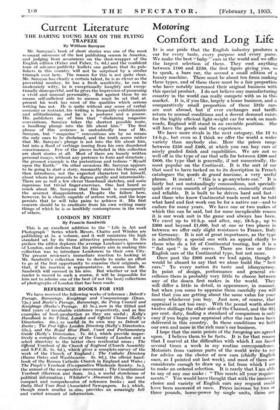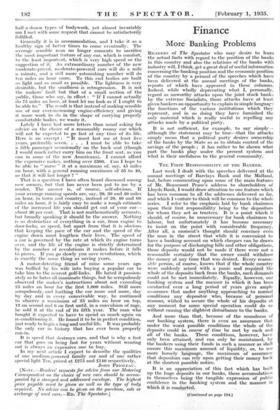Motoring
Comfort and Long Life
IT is our pride that the English industry produces a car for every taste, every purpose and every purse. We make the best "baby " cars in the world and we offer the largest selection of them. They cost anything between £100 and £250, the first figure giving you, so to speak, a bare car, the second a small edition of a luxury machine. There must be about ten lams making these types, and of these there must be a fair proportion who have notably increased their original business with this special product. I do not believe any manufacturing country in the world can really compete with us in this market. It is, if you like, largely a home business, and a comparatively small proportion of these little ears are sent abroad, but if ever exchanges and tariffs return to normal conditions and a decent demand exists for the highly efficient light-weight car for work on made roads, England will stand in an enviable position. She will have the goods and the experience.
We have more rivals in the next category, the 12 to 14-h.p., but even so I think we offer the world a wider variety than anybody else. Here the prices range between £250 and £400, at which you can buy cars of nicely graded finish and capabilities. We are not so well off in the type of car that sells for between £500 and £800, the type that is generally, if not numerically, the most popular on the Continent. It is the sort of car that used to have tacked on to its description in French catalogues the Words de grand tourisme, a very useful phrase. It meant : " this is a go-anywhere-car." It is fairly but not outstandingly commodious, not specially quiet or even smooth of performance, eminently sturdy and reliable. It is built to be 'driven hard and fast— and those who know Continental roads need not be told what hard and fast work can be for a native car—and to endure for many years. We have one or two makes of which this can be said, but for some inexplicable reason it is our weak suit in the game and always has been. We excel up to 12-h.p. and after, say, 18-h.p., up to £300 and beyond £1,000, but at one or two places in between we offer only slight resistance to France, Italy or Germany. It is not of great importance, as the type is admittedly a- special one with an appeal chiefly to those who do a lot of Continental touring, but it is a " flat spot " in the curve. There are two or three English cars of the Continental type, but not more.
Once past the £900 mark we lead again, though it would be absurd to say that we alone build the best cars." To every nation its taste and idiosyncrasy. In point of design, performance and general ex- cellence there is probably very little to choose between any of the dozen first makes in the world. They will differ a little in detail, in appearance, in manner, but when you come to appraise them carefully you will find that you are getting about the same value for your money whichever you buy. Just now, of course, that appraisal is not too easy. With the pound worth about twelve shillingi the other side of the Channel, and the MI per cent. duty, finding a standard of comparison is only easy if you begin your appraisal after the cars have been delivered in this country. In these conditions we hold our own and more in the rich man's car business.
I hope that the main points of the foregoing are agreed upon. I believe them to be facts. It is for that reason that I marvel at the difficulties with which I am faced several times a week in my routine correspondence. Motorists from various parts of the world write to me for advice on the choice of new cars (chiefly English ones, as I pointed out last week), and most of them are considerate enough to draw up a list from which I am to make an ordered selection. It is rarely that I am able to say of any one make : " This meets all your require- ments." You would have thought that with the immense choice and variety of English cars any request could hive been answered at once. Prices increase by two or three pounds, horse-power by single units, there are half a dozen types of bodywork, yet almost invariably am I met with some request that cannot be satisfactorily fulfilled.
Generally it is in accommodation, -and I take it. as a healthy sign of better times to come eventually. The average sensible man no longer consents to sacrifice the most important feature of any car, which is comfort, to the least important, which is very high speed or the suggestion of it. An extraordinary number of the new moderate-priced, moderate-powered cars- will do a mile a minute, and a still more astonishing number will do ten miles an hour more. To this end bodies are built as light and as small as possible. The lightness is very desirable, but the smallness =Is retrogression. It is not the makers' fault but that of a small section of the public, those who say, in effect : " If I cannot actually do 75 miles an hour, at least let me look as if I ought to be able to." The result is that instead of making sensible use of our ever-increasing engine-efficiency and giving It more work to do in -the shape of carrying properly comfortable bodies, we waste it.
Lately I have had more letters than usual asking for advice on the choice of a reasonably roomy car which will not be expected to go fast at any time of its life. Here is an excerpt : "'It must last me at least five years, preferably seven. . . . I must be able to take a fifth passenger occasionally on the back scat (though I would much rather carry him on the front seat, as you can in some of the new Americans). I cannot afford the expensive makes, nothing over £300. Can I hope to be able to " nurse " it at a maximum of, say, 45 miles an hour, with a general running maximum of 35 to 40, so that it will last longer ? "
That is a question I have often heard discussed among new owners, but that has never been put to me by a reader. The answer is, of course, self-obvious. If your average running speeds are, say, 20, 30 and 40 miles an hour, in town and country, instead of 20, 40 and 60 miles an hour, it is fairly easy to make a rough estimate of the increased life you should get out of your car— about 30 per cent. That is not mathematically accurate, but broadly speaking it should be the answer. Nothing is so destructive of everything in a Cdr.,. from engine_ to door-locks, as speck but apart from that it is obvious that keeping the pace Of the car and the speed of the engine down must lengthen` their lives. The speed of a ear is governed by the rate at which its engine turns over, and the life of the engine is strictly determined by the number of revolutions it makes before it falls to pieces. If you go slowly you save revolutions, which is exactly the same thing as saving years.
A motor-detesting friend of mine some Years ago was bullied by his wife into. buying a popular car to take him to the nearest golf-links. He hated it passion- ately as he hates all inanimate things, but he scrupulously observed the maker's instructions about not exceeding 25 miles an hour for the first 1,000 miles. Still more scrupulously, and loathing the car more and more: day by day and in every • conceivable way, he continued to observe a maximum of 25 miles an hour on top, 12 on second and 6 on first until, in a convulsion of rage, he sold it at the end of its fifth year. The man who bought it expected to have to spend as much again on re-conditioning it. He found it to be in perfect condition, just ready to begin a long and useful life: It was probably the only car in history that has ever been properly run-in.
It is speed that destroys cars, and that is why a fast car that goes on being fast for years without wearing out is always an expensive one to buy. In my next article I expect to describe the qualities of one medium-powered family car and of one rather special light Ten, priced at £275 and £140 respectively.
JOHN PRIOLEAU. [NOTE. Readers' requests for advice from our Motoring Correspondent on the choice of new cars should be accom- panied by a stamped and addressed envelope. The highest price payable must be given as well as the type of body required. No advice can be given on the purchase, sale or exchange of used cars.—ED: Tke Spectator.] .















































 Previous page
Previous page